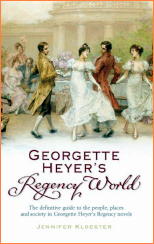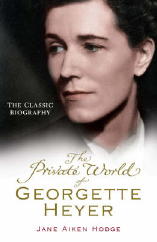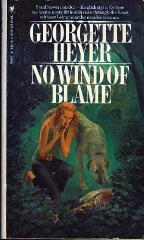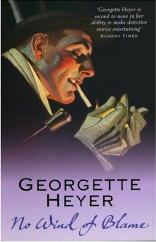Thu 3 Jul 2008
GEORGETTE HEYER – No Wind of Blame. Bantam; paperback reprint, September 1971. UK hardcover first edition: Hodder & Stoughton, 1939. US hardcover: Doubleday Crime Club 1939. Many other paperback reprint editions in both countries, including the bottommost one shown below (Arrow, UK, trade pb, 2006).

This is one of those small village murder mysteries which the British are known so well for. Georgette Heyer, born in 1902 and died in 1974, is known today largely for her historical romances, most of them from the Regency era, and mostly still in print.
Back in the 1930s, though, she also wrote a worthy amount of mystery fiction. (Of the 25 titles listed for her in Al Hubin’s Revised Crime Fiction IV, a rough reckoning is that 12 of them are detective novels; the rest appear to be historical fiction with some crime content.)
Her primary detectives were Superintendent Hannasyde and Inspector Hemingway; No Wind of Blame is one of the latter’s cases, although Hannasyde, his superior, makes a one or two paragraph cameo appearance, not so noted in CFIV.
The story begins with a visit to the Carter home of an Georgian (South Russian) prince, a gentleman forced from his homeland, and (quite obviously) in look of a good catch for a wife. That Ermyntrude Carter is already married seems to make no difference to him. Wallis Carter is rather worthless as a husband, quite dependent financially on his wife, who sighs and complains but sadly puts up with his profligate ways.

And it is Wally who is shot by a rifle while crossing a bridge as he is making his way to a neighbor’s house, where another make-some-money-quick scheme is being hatched. There are clues and suspects galore, none of the latter glaringly obvious, with the alibis of each are equally suspect.
The novel could be broken down in three parts, with the murder not occurring until page 78. The long opening section is devoted to introducing the players, and here is where Ms. Heyer excels. Each of the participants in the ensuing drama is individually drawn, stereotypes perhaps, in their way, but with mannerisms and behavior strikingly real and brought to life with dialogue and keen-eyed observations.
Part two consists of the investigation, conducted first by the local inspector, and man named Cook, who soon finds himself in over his head, outmatched by the limited number of suspects in their own inimitable fashion (although not in collusion with one another). Called in soon enough is Inspector Hemingway of Scotland Yard, who manages, with a dash of humor, to a keep a lid on the proceedings, but barely.
Most notable among the inhabitants of Palings, the Carter home, and those flitting in and out is Mrs. Carter’s teen-aged daughter Vicky, prone to poses and primed with outfits for each one. “Delightfully flaky” is a phrase that might be used to describe her, and she is a handful, but no slow thinker is she, by no means. (More later on this.)

Part three, if you are still keeping track, is the solution, which is a disappointment. While the opening stanzas are slow to get started, at least in this reader’s opinion, once the investigation begins, the story begins at once to pick up speed and become what is called a rattlingly good read. But in spite of all the clues, pointing every which way, and all of the alibis, which turn out not to be so solid after all, all it takes is the right phone call, upon which the culprit is identified immediately, followed by some fairly rigorous reconstruction of the crime required to prove the case in court.
How it was done surpasses the question at that point of who it was who did it, and it is not nearly (in this case) as interesting.
The characters and dialogue are right on, however, and if the occasion arises to read another of Georgette Heyer’s detective stories, by all means, I will.
In closing, though, here’s a long sample. Vicky, the dead man’s stepdaughter is trying her best to become a suspect, for reasons that become clear soon after. From pages 162-164, then, with one very important clue just happening to be included. (Mary is the dead man’s ward and cousin; Hugh is a gentleman friend of the family, who is becoming more and more attracted to Vicky, in spite of her spritely ways.) [A tip of the topper to the assist from the Georgette Heyer website, where the folks responsible also thought this was a key passage.]
EXCERPT —
“Darling Mary, no one who’d ever seen you with a gun could possibly think you’d fired a shot in your life,” said Vicky, with lovely frankness.
“It’s a funny thing, but it’s not often you’ll find a lady who won’t behave as though she thought a gun would bite her,” remarked the Inspector. “But I understand you’re not like that, miss?”
Vicky’s seraphic blue eyes surveyed him for a moment. “Did the Prince tell you that?” she asked softly.
“It doesn’t matter who told me, miss. Do you shoot?”
“No! I mean, yes, in a way I do,” said Vicky, becoming flustered all at once. “But I practically never hit anything! Do I, Mary? Mary, you know it was only one of my acts, and I’m not really a good shot at all! If I hit anything, it’s quite by accident. Mary, why are you looking at me like that?”

Mary, who had been taken by surprise by the sudden loss of poise in Vicky, stammered: “I wasn’t! I mean, I don’t know what you’re talking about!”
“You think I did it!” Vicky cried, springing to her feet. “You’ve always thought so! Well, you can’t prove it, any of you! You’ll never be able to prove it!”
“Vicky!” gasped Mary, quite horrified.
Vicky brushed her aside, and rounded tempestuously upon the Inspector. “The dog isn’t evidence. He often doesn’t bark at people. I don’t wear hair-slides. I’d nothing to gain, nothing! Oh, leave me alone, leave me alone!”
The Inspector’s bright, quick-glancing eyes, which had been fixed on her with a kind of bird-like interest, moved towards Mary, saw on her face a look of the blankest astonishment, and finally came to rest on Hugh, who seemed to be torn between anger and amusement.
Vicky, who had cast herself down on the sofa, raised her face from her hands, and demanded: “Why don’t you say something?”
“I haven’t had time to learn my part, miss,” replied the Inspector promptly.
“Inspector, it’s a privilege to know you!” said Hugh.
Vicky said fiercely, between her teeth: “If you ruin my act, I’ll murder you!”
“Look here, miss, I haven’t come to play at amateur theatricals!” protested the Inspector. “Nor this isn’t the moment to be larking about!”
Vicky flew up off the sofa. “Answer me, answer me! I was on the scene of the crime, wasn’t I?”
“So I’ve been told, but if you were to ask me –”
“My dog didn’t bark. That’s important. That other Inspector saw that, and you do too. Don’t you?”
“I don’t deny it’s a point. It’s a very interesting point, what’s more, but it doesn’t necessarily mean –”
“I can shoot. Anyone will tell you that! I’m not afraid of guns.”
“You don’t seem to me to be afraid of anything,” said Hemingway with some asperity. “In fact, it’s a great pity you’re not, because the way you’re carrying on, trying to convict yourself of murder, is highly confusing, and will very likely land you in trouble!”
“There is a case against me, isn’t there? You didn’t think so at first, but the Prince told you that I could shoot, and you began to wonder. Didn’t you?”
“All right, we’ll say I did, and there is a case against you. Anything for a quiet life!”
Vicky stamped her foot. “Don’t laugh! If I’m not a suspect, you must be mad! Quick, I can hear my mother coming! Am I a suspect or am I not?”
“Very well, miss, since you will have it! You are a suspect!”
“Angel!” breathed Vicky, with the most melting look through her lashes, and turned towards the door.
Ermyntrude same in. Before anyone could speak, Vicky had cast herself upon the maternal bosom. “Oh, mother, mother, don’t let them!”
The inspector opened his mouth, and shut it again. Mary said indignantly: “Vicky, it’s not fair! Stop it!”
Ermyntrude clasped her daughter in her arms. Over Vicky’s golden head, she cast a flaming look at Hemingway. “What have you been saying to her?” she demanded, in a voice that would have made a braver man than Hemingway quail. “Tell me this instant!”
July 5th, 2008 at 2:44 pm
“Death in the Stocks” (1935) is exceptionally funny, with an outrageous family trading bon mots.
“The Talisman Ring” (1936) is a pleasant historical by Heyer with some crime fiction elements.
July 6th, 2008 at 11:53 am
Mike
I have a short stack of Heyer’s mysteries here close to my desk, all from Bantam. I’ll try to make sure the next one I read is Death in the Stocks.
I don’t think I have a copy of The Talisman Ring, but if I see one sometime, I’ll make sure to pick it up. I won’t make the same promise about that one, though. Too many other mysteries to read, I’m afraid!
— Steve